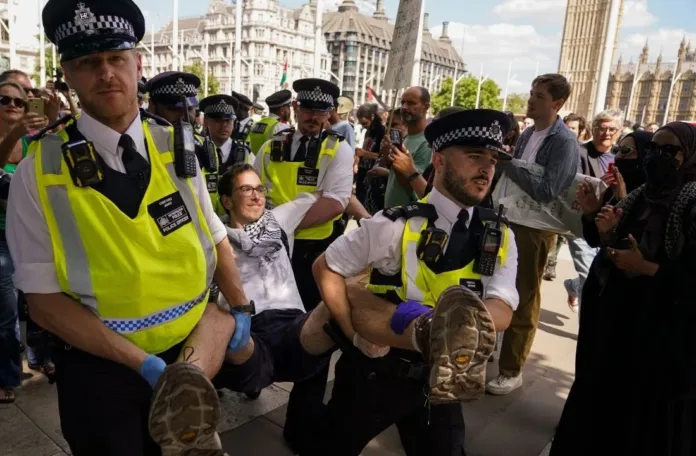Hundreds detained under terrorism laws in dramatic police sweep at banned group’s protest
London witnessed one of its most dramatic protest crackdowns in years on Saturday, as police arrested at least 532 people during demonstrations against the government’s ban on the activist group Palestine Action.
The Metropolitan Police confirmed that 522 arrests were made specifically for showing support for the proscribed organisation. The remainder included six arrests for assaulting officers, one for obstructing a constable, two for breaches of the Public Order Act, and one for a racially aggravated public order offence. The average age of those arrested was 54.
The day began with hundreds gathering in Parliament Square for a protest organised by campaign group Defend Our Juries. One individual was arrested earlier at the Palestine Coalition march in Russell Square, but the overwhelming majority of detentions occurred in Parliament Square, where protesters sat silently on the grass holding white placards bearing the words: “I oppose genocide, I support Palestine Action.”
Police vans lined the edges of the square as officers moved methodically through the crowd, escorting detainees away one by one. Several counter-protesters carried signs reading: “Palestine Action terrorises Britain while Hamas hides in hospitals, schools and mosques.” They, too, were quickly removed by officers.
Organisers claimed the police were preparing for “the largest mass arrest in their history,” expecting a turnout in the “low hundreds.” The Met disputed this, estimating between 500 and 600 people were present, including onlookers and media. “We are confident that anyone who came to Parliament Square to hold a placard expressing support for Palestine Action was either arrested or is in the process of being arrested,” a police spokesperson said.
According to police, those arrested were taken to two prisoner processing centres in Westminster. Many were bailed with strict conditions prohibiting them from attending further protests in support of the banned group. Defend Our Juries later announced that all detainees had been released without charge.
Amnesty International UK condemned the arrests as “deeply concerning.” Chief executive Sacha Deshmukh said: “Peaceful protest is a fundamental right. The protesters were not inciting violence, and treating them as terrorists is entirely disproportionate. This demonstrates why UK terrorism laws are dangerously broad and vague.”
The ban on Palestine Action, imposed last month by Home Secretary Yvette Cooper, makes it a criminal offence to be a member or supporter of the group, punishable by up to 14 years in prison under the Terrorism Act 2000. The move followed assessments by the Joint Terrorism Assessment Centre linking the group to violent attacks, serious injuries, and extensive property damage.
Speaking after Saturday’s events, Cooper defended the ban and thanked police for their work: “Tens of thousands marched in London to support Palestinian rights peacefully. This is very different from supporting this proscribed organisation, which has committed serious criminal acts. National security and public safety must remain our top priority.”
She added that many may not yet understand the “reality” of Palestine Action, but security assessments made it clear the group “is not a non-violent organisation.”
Since the ban took effect, more than 200 people have been arrested across the UK at related protests. Earlier this week, the first three individuals charged under the new offence were named as Jeremy Shippam and Judit Murray, both 71, and Fiona Maclean, 53.
Despite the mass detentions, campaigners vow to continue their actions. Defend Our Juries insists the arrests are an attempt to silence dissent over what it describes as “genocide in Gaza.” The group says it will challenge the government’s actions in court, framing the crackdown as a fundamental test of Britain’s commitment to free expression.
For now, Saturday’s images—of silent demonstrators being led to police vans under anti-terror laws—are set to fuel an escalating battle between the state’s security priorities and protesters’ claims to democratic rights.
